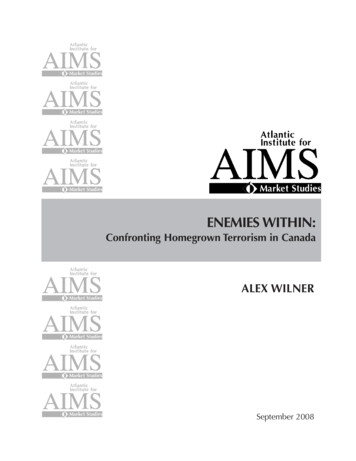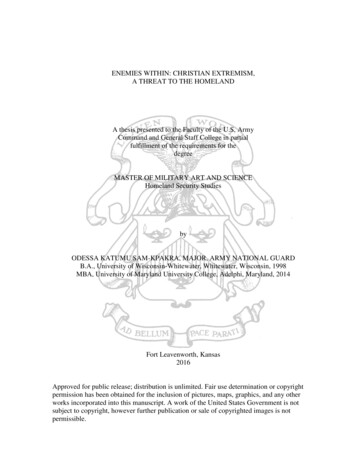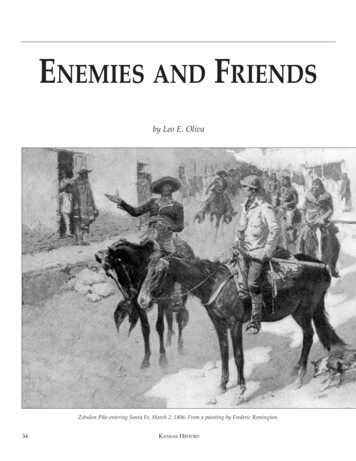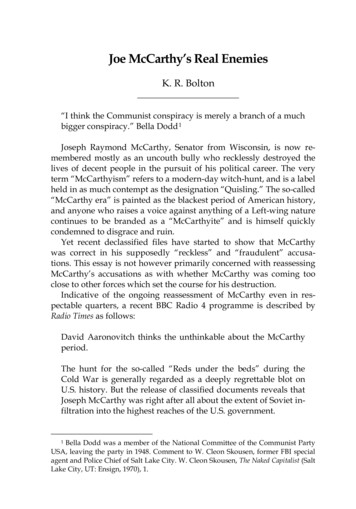
Transcription
Enemies of theModern WorldA triptych of novellasPaul Cudenec
winteroak.org.ukCopyright 2021 Paul Cudenec. The author formallyretains copyright over this work but permits noncommercial reproduction or distributionOccitanie, FranceISBN: 978-2-9575768-0-7
“The most basic task ahead of us is to bring asmany people as possible together around theconviction that the system has got to bedestroyed”Miguel Amorós
CONTENTS1Theo Carter72Swanboy1453The Game251
From ‘Our Stolen Freedom’For the last nine and a half years I have been living in prison. I eat prison food, I drink prison tea,I wash myself with prison soap and keep myselfwarm with prison blankets.I am also very much against prisons. Not justthis particular one, which is marginally preferable to the one in which I served the first part ofmy life sentence, but all prisons. I am against theprison system.Does this make me a hypocrite, that I remainalive and in reasonable health thanks to everything which the prison system provides?No, of course it doesn’t. I didn’t choose to bein prison. I would much prefer to be elsewhere, asyou can well imagine. But I have no choice. I amstuck in here and so I am forced to make use ofthe material and infrastructure around me.If I wanted to escape I would have to makeuse of prison cutlery to scoop away a hole in awall or to fashion a primitive weapon. Even if Ichose a less joyful way out, I would still have todepend on the world of the prison and use one ofits very own blankets to make myself a hangingrope.Before I was put in here, I lived in the outsideworld. The outside industrial capitalist world. Iused its money, consumed its products, communi-1
cated with others by means of its infrastructures.I was also very much against the industrialcapitalist system.Did this make me a hypocrite?2
I d’ont really kno who I am. I thout about this becoase of what Dad told me from a book he is reeding, which sounds rely interetsing.The man says we need to kno who we aredeep in syde us, which is stragne to me because Id’ont think there is somthing diferant in syde methat is not the Boy that everybody knoes and luves(NOT!!).But if their is somwone inside me that is notthe saym as waht pepole thinck, then who exsatlyis it or waht is it becoase Dad says it mihte befrom all of nacher and the hole yunivers.That mussed be y Ozman can tern himsselfin to a Bird. I wishe I cuod do that and jussed flya way.3
UndatedThe other day, I stopped to look at the old yewtree down by the river near Merryford. It isn’tdead yet, although you might think so from a distance. It is still pushing out sparse shoots ofgreenness, little tufts of vitality defying its destiny. And it came to me that I, too, am one ofthose little tufts. I have always felt within me,ever since I was a girl, an overwhelming sense notjust of being alive but of thirsting to be morealive, still more alive, to be radiating with life,bursting, overflowing, exploding! Is this the ‘feeling’, for want of a better word, that pushes out theliving tufts from the old trunk? What is that urgeto be and to be more, to reach out, to embrace andto become? And what happens to that feeling, thatdesire, when it is thwarted by the world outside,by circumstances beyond itself, which it cannotcontrol? For I have always also felt that frustration, that constant sense of being blocked, stifled,crushed by a thing surrounding me that I haveoften imagined as a cage. All those rules aboutwhat we shouldn’t do, about how we shouldn’t letloose the living within! Don’t run, don’t sing,don’t scream! Don’t touch, don’t taste, don’tdream! And then all those expectations about theperson we should turn ourselves into, all the barriers they erect to define the limits of our possible4
being. Barbed wire fences around our souls! Theytell us that the sunlight and the freedom we cravedon’t even exist. Have never existed. There is nogreat outdoors, no fresh air, no world of exaltation, they say. There is no reality beyond thiscardboard-and-plastic replica so carefully builtup around you to provide you with the impressionof being alive. But I have always known this is alie. A flimsy lie. And the green shoots of my lifeenergy have kept pushing against the lie, forcingit back, forever searching for a way round it, beneath it, above it or straight through it.But what has that made me? What do youcall a simple joyful will-to-be that for decade afterdecade is kept confined, imprisoned, frustrated?What do you call the driving impulse behind thisbecoming when it has been forced to keep smashing its innocent head against the concrete walls ofincomprehension, of stagnation, of dullness andartifice?This is not simple life-energy anymore. Lifeenergy constantly denied is forced to take on a different form and character.5
6
1THEO CARTERThere was something so clear about that Fridaymorning in May that it felt almost unreal.From the moment that Theo was awoken bythe joyful trilling of the blackbird in the copperbeech outside his bedroom window, the morningseemed to represent something beyond itself.This impression did not, for the moment,take the form of a conscious thought in Theo’smind but rather of an emotion. He felt happy.The day into which he had emerged felt like arepresentation of this happiness, this inner statewhich shone out on to everything around himand bathed it in the light of perfection.Everything seemed exactly as it should, fromthe sharp sunlight in the kitchen, to the gurglegrowling of the kettle, the click as it turned itselfoff, the faint odour of the teabag, the heat of themug in his hand, the humming of the fridge.There even seemed something just right aboutthe way the toast got stuck in the toaster, aboutthe slightly burnt crust.7
The tattiness of his flat seemed perfect, thehall carpet beautifully worn and faded, the crackin the frosted bathroom window the touch ofsome master craftsman.The metallic ringing of his footsteps downthe outside staircase merged seamlessly with therustling of leaves, the passing of traffic and thewhine of a tube train pulling out of Wotton Parkto create an exquisite symphony of the familiar,reassuring sounds which had accompanied hislife for so many years.Theo loved the fact that at 8.30am there wasstill a little chill in the air, he loved the energythat he still felt in his 50-year-old legs as heskipped over Yew Tree Lane and headed up towards Little Wotton.He was so pleased to exchange a few goodmornings along the way – with Faduma and herkids from over the road, with Frank who used towork at the newsagent’s and with a pale littlered-headed girl at the bus stop whom he’d neverseen before but, with her eyes of brightest greenand her quick smile of the most radiant humility,somehow seemed to embody all the vital energyhe felt rising up through the city on this to-befateful morning.The green man lit up on the pedestriancrossing just at the right moment for him tostroll across the road, traders rolled up theirblinds at the very moment that he passed, two8
playful mongrels chased each other round thecorner of Mafeking Road just as he reached itsred-brick Victorian splendour.It was all so perfect, so choreographed, thatit felt like the opening scenes of a film. Every little incident, every little exchange – such as theway that Taavi was putting Theo’s takeawaycappuccino on the counter as he walked in andthe way that he, for his part, already had theright change ready to slap down beside it – spokeof a well-established daily routine.The whole point of this cinematic introduction to Theo’s life, which he had the strange impression of experiencing half as participant andhalf as spectator, was to imply a status quo, ageneral state of affairs that formed the background and foundation of whatever was to comenext.In one way, it spoke of permanence, of a lackof change that had allowed this reality to blossom to such a point of effortless perfection. Butin another way it spoke of impermanence, for thecontext in which this reality was being presentedwas that things were very soon going to change.The essence of Theo’s current life had come tofruition on this Friday morning in May, it suggested. Its perfection was a peak which could beneither sustained nor surpassed.Again, Theo did not initially give shape tothis reflection, but it nevertheless fermented in9
his unconscious mind and flavoured the way hewas experiencing the start of his day. Whatshould have been the innocent enjoyment of afine moment of his life took on a bitter-sweettinge, as is so often the case. Illusory perfectionand permanence slip out of our grasp the moment we imagine we have secured them.Finally, just as he reached Kelmscott Roadand the final 100 yards before the Infoshop, thishidden realisation reached the surface of hisbrain and he found an inner voice talking himthrough the last leg: “Look, Theo, this is whereyou live, this place, this is where you have madeyour life. You have made it work here, you havefound somewhere where you can stay still. It’sbeen nearly 15 years now, Theo, in Wotton.Seven years since the Infoshop opened. Yes,you’re good here, mate. You’re stable. Feet on theground. Growing roots. And Isha? No, she’s gonenow but it doesn’t matter, that’s the thing, itdoesn’t matter. You’ve got over her, you’ve movedon. That’s quite something, eh? Look around,Theo, look at this road, these little shops, thesepeople – see how that old bloke over the road justwaved at you. Look at this treasure you’ve found.You’re accepted here, Theo. You can relax. Beyourself. At last you’ve got a home”.If you detect, in this little interior monologue, a little too much in the way of selfreassurance, then you have glimpsed another10
side to the apparently self-confident professionalcommunity activist enjoying a moment of peaksatisfaction. You have caught sight of the insecurity which often nagged away at Theo, the doubtsabout himself and the life he was leading whichunderlay his being at all times, even if he rarelyallowed them to become visible to himself, letalone to others.Theo’s right hand gave the cappuccino to theleft one so that it could fish the keys out of hispocket, as it did from Tuesday to Saturday eachand every week. It rolled up the security blinds,swung open the front door and switched on thecomputer. Then, after Theo had flopped on to thesofa by the window, it resumed its coffee-holdingduties as he savoured his first ritual treat of theday.A quarter of an hour later, he had startedwork, checking through the emails and socialmedia accounts. He liked to get this done firstthing, before Jay turned up. Not just because Jaytalked a lot, because he did, but because Theoliked Jay’s chatter and wanted to listen to it andjoin in properly, rather than merely grunt littleaffirmations or notes of surprise while trying toconcentrate on something else.The first message he opened was from theAnderson-Butler Fund for Social Change, confirming that this month’s funding had gone intothe account. This was unsurprising but always11
welcome news. That chance encounter with Jefffrom The Radical Impact Project, the evening inCamden where he had told him about his groupof friends and their vision for a local initiativedown in Wotton, Jeff’s tip-off about the ABFSCand subsequent endorsement of his bid – all ofthat had made what he was currently doing possible. The timing had been exceptional, as well.The morning after Theo saw yet another job fallapart under his feet – this time because the cyclerepair shop had been evicted for unpaid rent –news had come through that the bid had beenapproved in full. The funding was not massive inusual business terms, but, together with one ortwo other contributions they had managed toscrape together, it was enough to run theInfoshop and pay Theo, on what was admittedlya very low wage, to work on it full-time, plussome other part-time participation. The monthlyemail from the ABFSC served, therefore, as aprompt for Theo to offer a little silent prayer ofthanks.There was a lot of social media to siftthrough. In inspiration, the Infoshop was verymuch a frontline activist project, although thatwasn’t so obvious at the moment. There had beena deliberate idea of building a wide communitynetwork, based around the physical location,which could be activated in case of emergency.The nature of this possible emergency shifted in12
Theo’s mind from year to year. Sometimes itseemed it would involve evictions. Sometimes itfelt as if the ever-present road-widening threat toThorbury Common would spark a full-scale mobilisation. At the moment, given the political climate, Theo imagined that immigration raidswould be the issue that called for a big response.It really felt as if fascism was lurking on thedoorstep and he for one was not going to standaside and let it in.Theo, Jay and the others (what others?Nikki and Denise never came any more, Nathanwas shacked up with his boyfriend on the otherside of the city.) had pre-empted any such possibility by creating a network of social mediachannels that could all be used for one purpose ifthe need arose. Some of them were activist accounts openly linked to the Infoshop – WottonAnti-Raids, Wotton Solidarity and CommunitiesAgainst Capitalism, for instance. But they alsoran accounts with broader appeal, such as theLittle Wotton Friendship Network or TuesleyBorough Civil Liberties Society. There were alsothe individual accounts, where each of them triedto develop “characters”, using humour and localreferences, to draw in followers who might havebeen put off by the political tone of their otherentities. Several of these had fallen by the wayside, of course, but Theo had kept his part of theoperation going and now boasted a considerable13
reach into Wotton and its immediate hinterland.Theo looked up from the screen. Someonehad just come in. It was Prateek from next door,wanting an update on the plumber who was supposed to be coming to sort
There is no reality beyond this cardboard-and-plastic replica so carefully built up around you to provide you with the impression of being alive. But I have always known this is a lie. A flimsy lie. And the green shoots of my life-energy have kept pushing against the lie, forcing it back, forever searching for a way round it, be-neath it, above it or straight through it. But what has that made .











